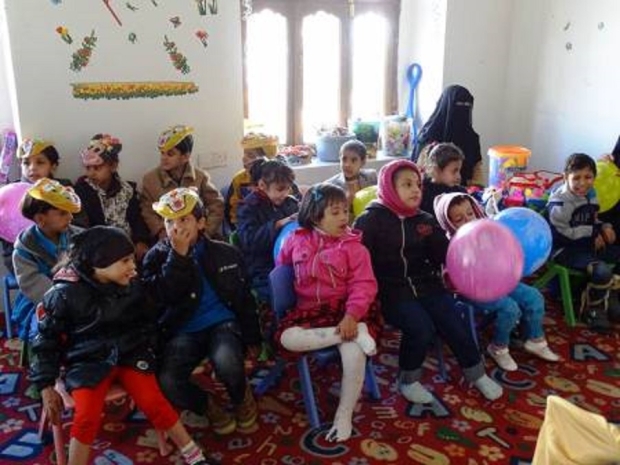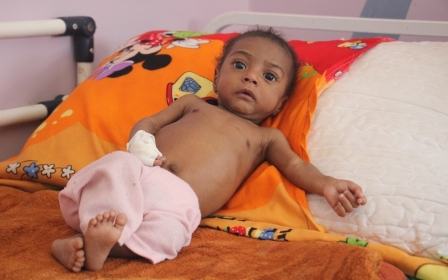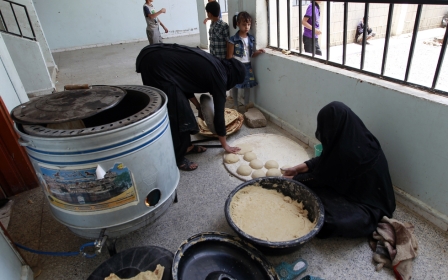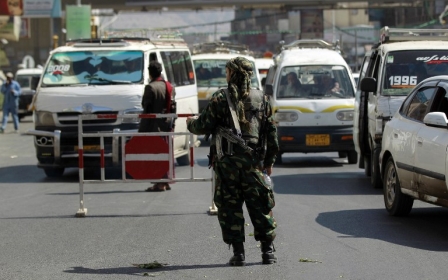Yemen's war imperils service for children with cerebral palsy
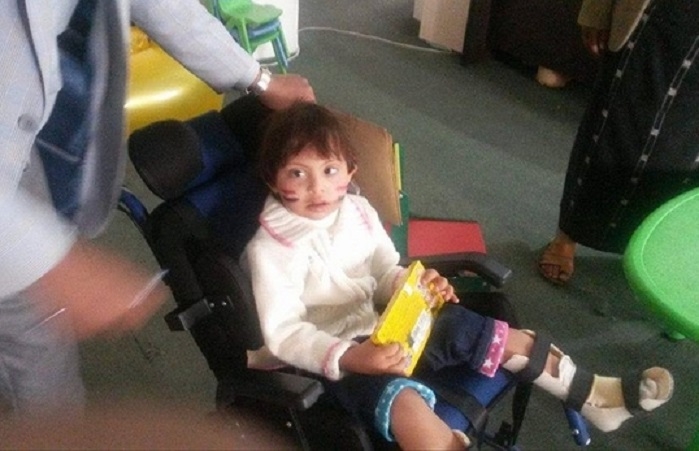
SANAA - "My daughter cannot speak or move her body easily because of cerebral palsy. This has been the case since her birth. It hurts my heart, but I cannot change destiny," Ritaj's mother Ghadir said, sighing deeply while caressing her child's forehead.
Eight-year-old Ritaj Abdulghani is waiting with her mother for a specialist at the Right to Live Foundation for Cerebral Palsy Children (RLFCPC), which is situated in the heart of Sanaa in a highly populated neighbourhood in the Yemeni capital.
The non-governmental organisation aims to help children with cerebral palsy improve their health and integrate into society so that they can realise professional and personal life goals as far as possible.
Since it was established in November 2006, it has offered specialised healthcare to around 150 children.
Lying in her mother's lap, Ritaj cannot move her hands or legs or speak. According to Ghadir, Ritaj was born with cerebral palsy, and she is not the only child who needs vital assistance. At least fifty others are on a waiting list eager to receive support: occupational therapy, physical therapy and nursery and kindergarten classes.
No stone left unturned
But this is not the only problem that Ritaj, her family and other Yemenis have been facing since the outbreak of civil war in 2015. The war has exacerbated an already dire situation in the poorest country in the Middle East, where 80 percent of Yemen's civilians live on humanitarian assistance and a looming famine is threatening half the population.
According to reports by the United Nations, children are the most vulnerable group, with more than 370,000 children in Yemen at risk of starvation.
Aerial bombardments by coalition forces and fighting on the ground have killed at least 7,000 people and internally displaced at least 2.4 million.
As a result of the ongoing war, Yemen's health system is collapsing steadily. Hospitals have been bombed, many have closed and medical supplies are scarce, making even treatable diseases incurable.
Although the exact cause of cerebral palsy is unknown, most specialists agree that the condition can ensue from pregnancy-related problems when the embryo's brain sustains damage or does not grow correctly, or if there are maternal health issues or labour complications. A few cases of cerebral palsy are know to have been caused when the foetus suffers a stroke. Some of the outwardly physical manifestations of cerebral palsy include involuntary and impaired body movements.
Ghadir said her daughter has improved since she started receiving healthcare at the foundation, which she has been visiting for two years and four months. Apart from Fridays, her daughter partakes in daily rehabilitation programmes to improve her physical and verbal abilities.
However, as the country slides further into war, poverty and insecurity, the foundation is struggling to keeps its operations running and to meet patients' needs.
Nabil Awad, a member of the board of trustees at the foundation, said they have been operating in a "state of emergency" since the onset of the war.
'The foundation has left no stone unturned to keep running for the sake of the children afflicted by cerebral palsy'
Speaking to Middle East Eye at the foundation's headquarters, Awad said: "The foundation has left no stone unturned to keep running for the sake of the children afflicted by cerebral palsy. These children are utterly destitute and so stopping the services of the foundation will be a huge setback for them."
The war in Yemen has brought several health institutions to a standstill. Multiple health centres have halted operations due to a shortage of electricity, petrol and medical supplies or because of air strikes.
"The conflict has caused the cerebral palsy children foundation a variety of problems. The financial and practical support we used to receive has stopped. The businessmen and philanthropists cut their aid due to the deteriorating economic situation we have been witnessing. It is an unprecedented situation," said Awad.
The war in Yemen has brought several health institutions to a standstill. Multiple health centres have halted operations due to a shortage of electricity, petrol and medical supplies or because of air strikes
A region beset by turbulence
Yemen has been beset by turbulence since 2011, the year in which the Arab Spring flared up. After several wars fought against former president Ali Abdullah Saleh, Houthi militants, hailing from the north of Yemen, seized Sanaa in 2014.
Then in February 2015, the Houthis placed President Abd Rabbuh Mansour Hadi under house arrest. A month later, he managed to flee south to Aden and the Houthis followed him, triggering a civil war and Saudi military intervention in March of last year.
"In the wake of March 2015, the war and blockade made life harsh not only for the cerebral palsy children, but the whole nation. At the foundation, we had been planning to launch further care programmes for the cerebral palsy children. The plans have now all backfired because of the situation in the country," said Awad.
Only the kids of the have-nots
When times were better, every day the foundation's bus used to pick up all of the children participating in its programmes from different neighbourhoods and take them to the centre. Now this service can no longer be extended to everyone because of the high fuel costs. Only those children whose families are very poor are offered transportation to and from the foundation.
"Due to fuel price hikes, the foundation has decided to provide transportation to the poorest kids only. The fuel crisis has made transportation too costly. The children are dispersed throughout several neighbourhoods in a vast city. Those children who belong [to] a well-off [family] have to find a way to come at their own expense," said Awad.
The foundation says it has been endeavouring to contact international aid organisations for help, but no saviour has shown up yet. "The foundation has communicated with humanitarian organisations in order to try to obtain financial aid. However, these organisations have apologised to us, saying we are not their partner and that the activities of our organisation are not on their agenda," said Awad.
MEE spoke on the phone with Mohammed al-Asaadi, a spokesman for the UN children's agency, UNICEF. He briefly stated that the activities of the agency do not focus on conditions like cerebral palsy.
"UNICEF does not work in this field. We attempt to save the lives of millions of children from lethal diseases such as cholera and malnourishment - but unfortunately we cannot do everything," Asaadi told MEE.
Fear of resounding planes
Fourteen-year-old Hadil al-Joubi is another child with cerebral palsy who has had the condition since birth. According to Sumaih al-Awalqi, a child healthcare specialist at the foundation, Hadil's situation has become much more severe because of the continuous air strikes by the Saudi-led coalition.
Hadil's house is located near a military camp in the Houthi-held capital. "When the air strikes hit the area a couple of months ago, all those inside the house ran away out of fear. Only Joubi could not because of her disability. But Joubi's mother rushed to help her move from the danger zone. Hadil has been extremely traumatised ever since and she suffers from terrible panic attacks every time planes are heard in the sky above," Awalqi explained.
On 8 October, a couple of deadly air strikes hit a funeral hall in the Hadda neighbourhood of Sanaa, claiming the lives of more than 140 people and injuring at least 525. The foundation is situated in the same area and the power of the blast sent a shockwave through the city.
"Children in Yemen, particularly in conflict-stricken areas, are suffering from collective trauma, and the repetitive deafening bombardments aggravate the conditions of cerebral palsy children," said Awalqi.
"These children have the right to receive due care to, manage their disabilities and be able to accomplish their dreams and the dreams of their parents. Despite the seemingly overwhelming obstacles, this is what this foundation is trying to help them do at this difficult time," said Awad.
This article is available in French on Middle East Eye French edition.
New MEE newsletter: Jerusalem Dispatch
Sign up to get the latest insights and analysis on Israel-Palestine, alongside Turkey Unpacked and other MEE newsletters
Middle East Eye delivers independent and unrivalled coverage and analysis of the Middle East, North Africa and beyond. To learn more about republishing this content and the associated fees, please fill out this form. More about MEE can be found here.


